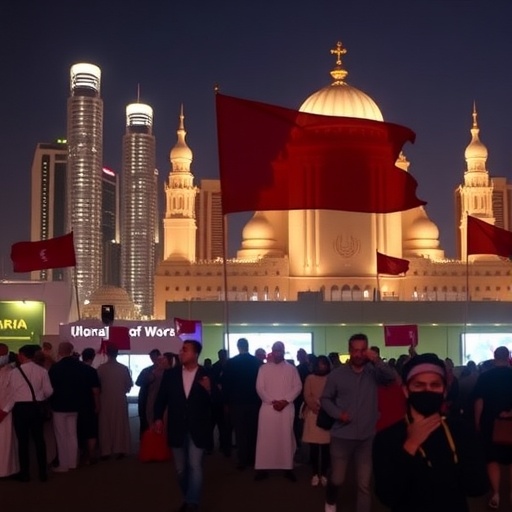Qatar, a small nation that has often been under the global radar, has emerged from the shadows to assert itself as a significant player in the complex domain of international politics. This transformation is not merely attributed to its vast reserves of oil and natural gas but is fundamentally rooted in a keen understanding of strategic specialization and a unique brand of defensive activism that the country has adopted in the shifting tides of the global power structure. A new article examines how Qatar’s political maneuvers reflect a nuanced assertion of power, positioning the nation as an authoritarian middle power amidst global giants.
Strategic specialization, as outlined by Chaziza and Lutmar, involves Qatar’s focus on specific areas where it can exert influence and harness its resources effectively. The nation has made deliberate choices to capitalize on its wealth, particularly in sectors such as energy, media, and diplomacy. For instance, Qatar has invested significantly in the energy sector, not just in extraction but in becoming a pivotal player in liquefied natural gas (LNG) exports. This industry has not only bolstered its economy but has also garnered Qatar influence among energy-importing nations that rely heavily on these resources for their energy security.
Furthermore, this specialization extends to Qatar’s soft power initiatives, which include its ownership of Al Jazeera, the media network that has provided an alternative narrative in the Middle East. Through such platforms, Qatar has been able to project its influence beyond its geographical confines. The country has positioned itself at the center of pivotal discussions that shape regional and global narratives, challenging the traditional media domination that has long obscured diverse voices.
In addition to its energy strategy and media outreach, Qatar engages with global powers through careful and calculated diplomacy. By fostering relationships with varied countries, from the United States to Iran, Qatar has established itself as a mediator in regional conflicts. This ability to engage with both allies and adversaries is a testament to its adept maneuvering within the concatenated web of global relations. It has hosted negotiations and dialogues that bring opposing sides to the table, demonstrating its role as a facilitator of dialogue rather than conflict.
However, Qatar’s rise as an authoritarian middle power is not without its critics. The concentration of political power within the ruling elite raises questions about the nature of governance and individual freedoms in the country. Observers argue that while Qatar projects an image of modernity and progress, the underlying authoritarian structures limit genuine democratic engagement and civil liberties. These contradictions create a complex narrative around Qatar’s identity, as it seeks to maintain a balance between internal stability and external perception.
Moreover, Qatar’s defensive activism plays a crucial role in its international posture. Faced with regional adversaries and a chaotic geopolitical climate, Qatar has taken steps to protect its sovereignty and interests. This has manifested in various ways, including military agreements with Western powers and a robust national defense strategy that seeks to deter potential threats. The establishment of a significant U.S. military presence on Qatari soil not only fortifies its defense but also symbolizes a strategic partnership that acts as a deterrent against regional aggression.
The adaptation of a defensive posture also reflects a response to the Arab Spring’s tumultuous impacts on regional dynamics. Observing the unrest in neighboring countries, Qatar has been proactive in securing its regime while promoting stability through financial support and strategic alliances. This activism showcases a deep understanding of the fluid nature of power in the region and the need to adapt swiftly to maintain geopolitical relevance.
Interestingly, Qatar’s approach may also hold lessons for other states in similar positions. As the global balance of power continues to evolve with the shifting loyalties and strategic interests, countries with limited resources can learn from Qatar’s playbook. The key lies in identifying areas for specialization and engaging in smart diplomacy that capitalizes on unique strengths and strategic assets.
The ongoing exploration of Qatar’s ascent also reveals a broader trend in global politics where small states can wield significant influence through innovative strategies. The era of towering superpowers has seen the emergence of what can be termed “middle powers,” defined not solely by military capability but by strategic diplomacy and economic specialization. As Qatar continues to navigate these waters, its blend of authoritarian governance with a keen sense of global positioning offers a fascinating case study for political scientists and international relations experts alike.
In conclusion, Qatar’s rise to prominence in the global arena as an authoritarian middle power is underpinned by a sophisticated interplay of strategic specialization and defensive activism. By leveraging its resources wisely, cultivating soft power through media, and engaging diplomatically with a diverse array of partners, Qatar has crafted a unique identity that challenges traditional notions of power dynamics. The patterns emerging from this small yet influential nation may well shape the future of international relations, serving as a blueprint for others seeking to carve out a place on the global stage.
As the geopolitical landscape continues to evolve, the lessons gleaned from Qatar’s unique approach to power dynamics underscore the importance of adaptability, strategic foresight, and the willingness to engage in an increasingly complex global order.
Subject of Research: Qatar’s geopolitical strategies and its emergence as an authoritarian middle power.
Article Title: Qatar emerges as an authoritarian middle power through strategic specialization and defensive activism in the global system.
Article References:
Chaziza, M., Lutmar, C. Qatar emerges as an authoritarian middle power through strategic specialization and defensive activism in the global system. Discov glob soc 3, 157 (2025). https://doi.org/10.1007/s44282-025-00300-7
Image Credits: AI Generated
DOI: https://doi.org/10.1007/s44282-025-00300-7
Keywords: Qatar, authoritarianism, middle power, strategic specialization, global diplomacy, energy politics, soft power, defensive activism.




